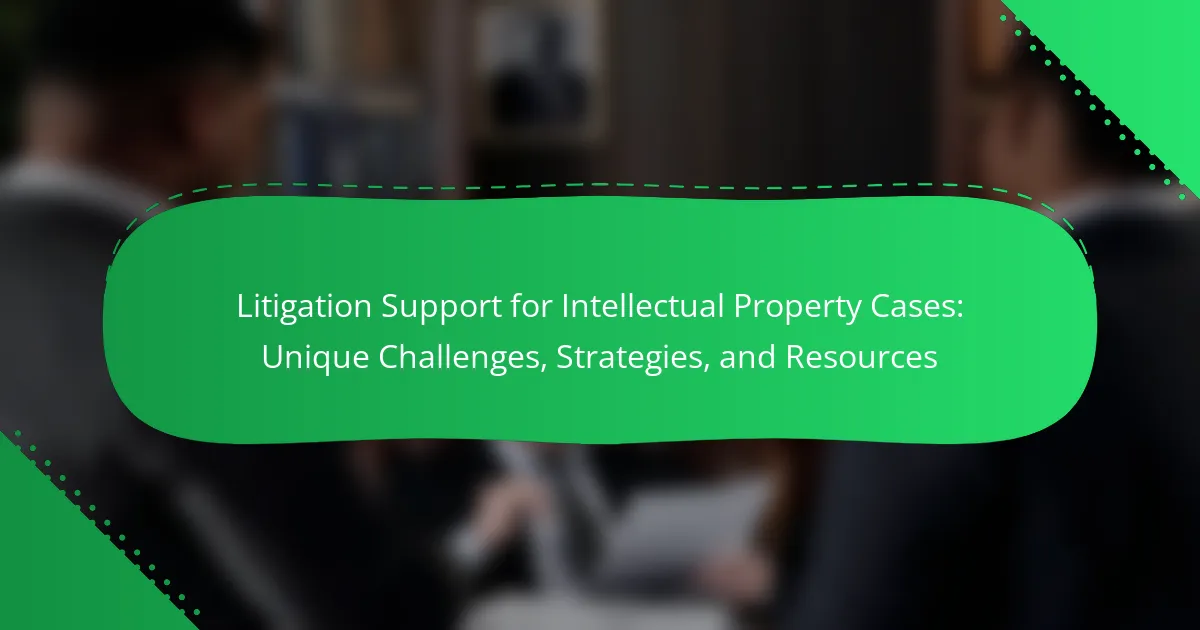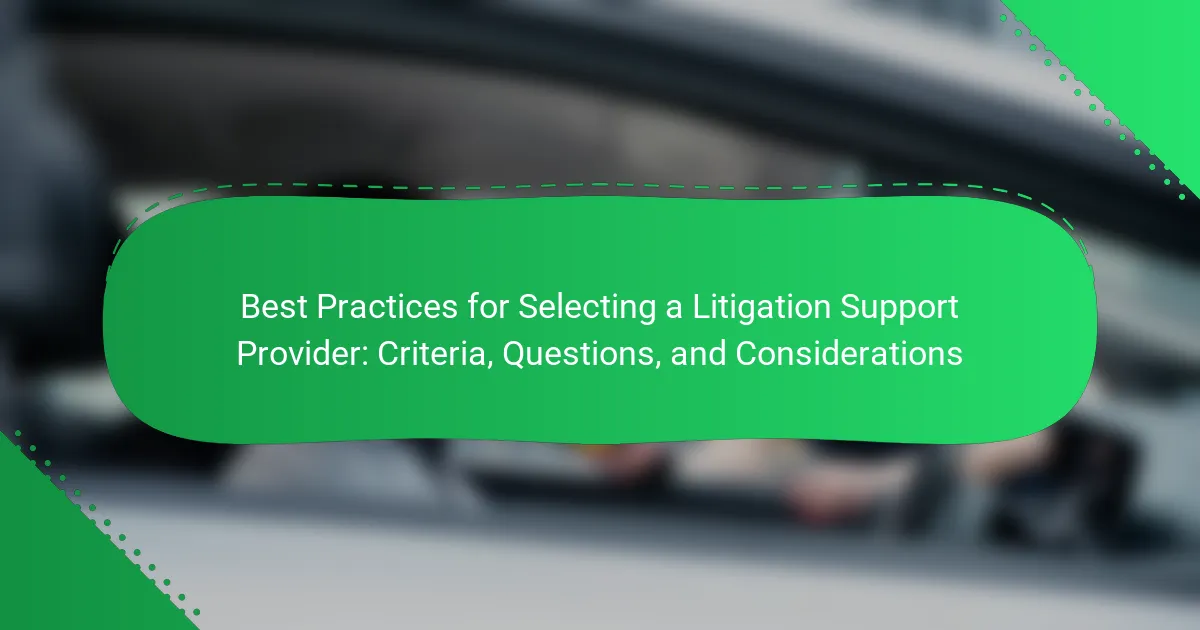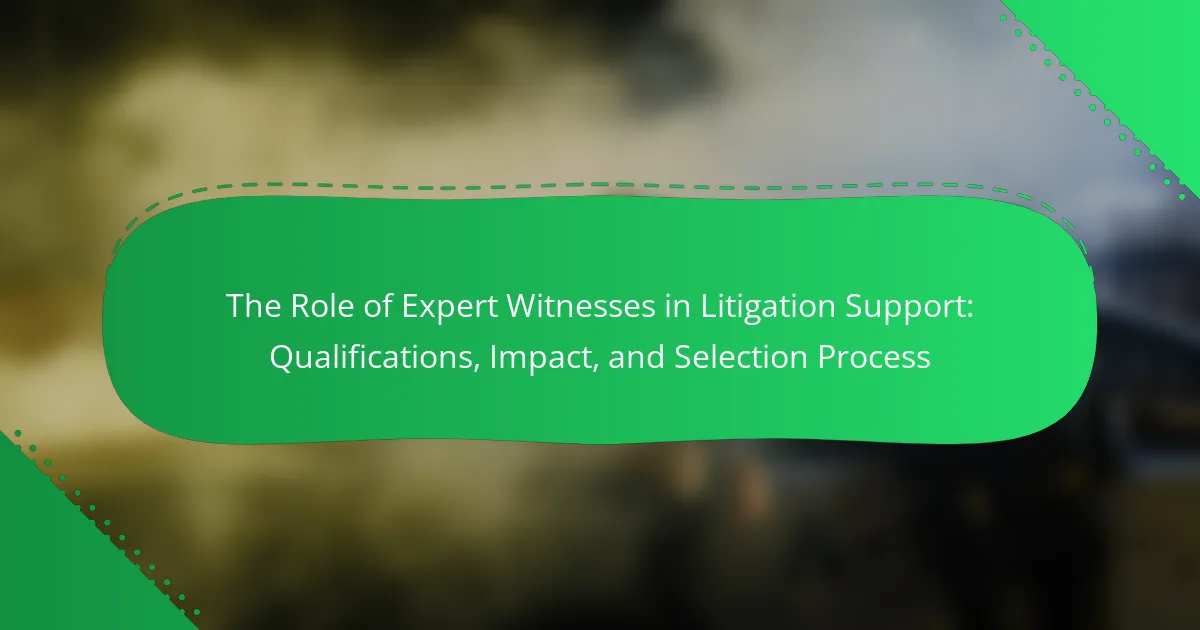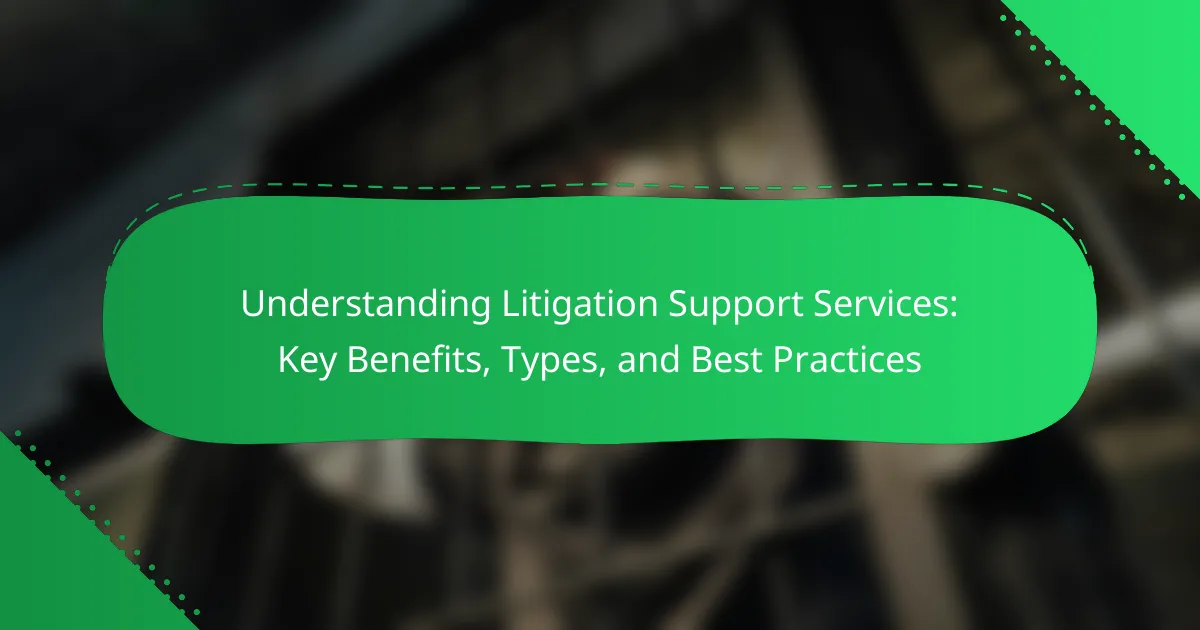Litigation support for intellectual property (IP) cases encompasses a range of services designed to assist legal teams in the management and resolution of IP disputes. Key services include document management, expert witness selection, and trial preparation, all aimed at effectively handling technical evidence and providing insights into IP laws. This article explores the unique challenges faced in IP litigation, the strategies employed by professionals in this field, and the resources available to enhance case management and settlement options. Effective litigation support is crucial, as it can significantly impact the efficiency and outcome of legal proceedings in intellectual property disputes.
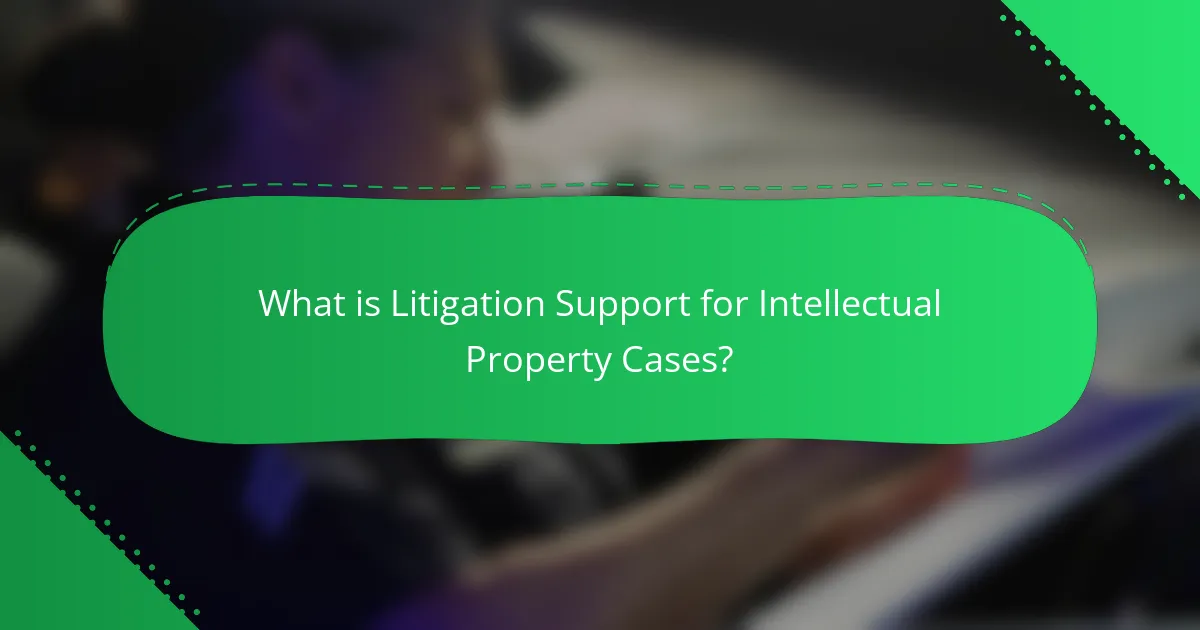
What is Litigation Support for Intellectual Property Cases?
Litigation support for intellectual property cases refers to services that assist legal teams in managing and resolving IP disputes. These services include document management, expert witness selection, and trial preparation. Professionals in this field analyze technical evidence and provide insights into IP laws. They help in gathering and organizing evidence crucial for litigation. Additionally, they may offer strategic advice on case management and settlement options. Their expertise can significantly influence the outcome of IP litigation. According to a report by the American Intellectual Property Law Association, effective litigation support can enhance the efficiency of legal proceedings.
How does litigation support function in the context of intellectual property?
Litigation support in the context of intellectual property involves providing specialized assistance to legal teams handling IP cases. This support includes gathering and analyzing evidence related to patents, trademarks, and copyrights. It often involves document management, expert witness coordination, and trial preparation.
Litigation support professionals help in identifying relevant prior art for patent disputes. They also assist in the valuation of intellectual property assets during litigation. Research indicates that effective litigation support can significantly enhance case outcomes. According to a study by the American Bar Association, cases with robust litigation support have a higher success rate in court.
What are the key components of litigation support in IP cases?
The key components of litigation support in IP cases include expert witness services, document management, and data analysis. Expert witness services provide specialized knowledge to support legal arguments. Document management involves organizing and handling relevant legal documents efficiently. Data analysis helps in evaluating evidence and trends related to the intellectual property in question. Additionally, trial preparation and strategy development are crucial. These components ensure that legal teams can present compelling cases. Effective litigation support can significantly impact the outcome of IP disputes.
How does litigation support differ from general legal support?
Litigation support focuses specifically on the processes and resources needed during legal disputes. It includes tasks like evidence management, expert testimony coordination, and trial preparation. General legal support, however, encompasses broader legal services such as document drafting, client consultations, and compliance advice.
Litigation support is often time-sensitive and requires specialized skills in trial strategy. General legal support can be more routine and ongoing in nature. The distinct emphasis on trial readiness in litigation support sets it apart from the more general functions of legal support.
What unique challenges are faced in intellectual property litigation?
Intellectual property litigation faces unique challenges such as proving ownership of the intellectual property. Establishing the originality and validity of the intellectual property is often complex. Infringement cases require detailed technical analysis, which can be costly and time-consuming. The legal landscape is constantly evolving, making it difficult to stay current with laws and regulations. Additionally, damages can be hard to quantify, complicating settlement negotiations. Jurisdictional issues may arise, especially when dealing with international cases. The burden of proof often lies with the plaintiff, increasing their risk. These challenges necessitate specialized legal expertise and resources to navigate effectively.
How do the complexities of IP law impact litigation support?
The complexities of IP law significantly impact litigation support by necessitating specialized knowledge and resources. IP law encompasses various types of rights, including patents, copyrights, trademarks, and trade secrets. Each category has distinct legal requirements and enforcement mechanisms. This complexity requires litigation support teams to possess in-depth expertise in specific IP areas. Effective litigation support must include thorough research on case law and regulations relevant to the IP in question. Additionally, the valuation of IP assets often involves intricate financial analysis and market assessments. For instance, patent litigation may require technical experts to interpret complex inventions. The multifaceted nature of IP disputes can lead to longer case timelines and increased costs. Consequently, litigation support must adapt to these challenges with tailored strategies and tools.
What are the common pitfalls in IP litigation that support teams must address?
Common pitfalls in IP litigation include inadequate evidence collection, which can weaken a case. Support teams often fail to identify and preserve key documents and digital evidence. This oversight can lead to lost opportunities in proving infringement or defending against claims. Additionally, miscommunication between legal teams and technical experts can result in misunderstandings of complex technology. Such gaps can hinder the effective presentation of a case. Another pitfall is the lack of a clear strategy for managing timelines and deadlines. Missing critical deadlines can severely impact litigation outcomes. Furthermore, insufficient understanding of jurisdictional nuances can lead to improper filings. This can complicate the legal process and delay resolution. Finally, failure to anticipate and prepare for counterclaims can leave a party vulnerable. Addressing these pitfalls is essential for successful IP litigation outcomes.
What strategies can be employed to enhance litigation support for IP cases?
Implementing advanced technology is a key strategy to enhance litigation support for IP cases. Utilizing e-discovery tools can streamline the process of gathering and analyzing large volumes of data. This technology aids in identifying relevant documents quickly and efficiently. Collaboration platforms can improve communication among legal teams, ensuring all members are aligned.
Investing in specialized training for staff enhances understanding of IP laws and litigation processes. This training equips team members to handle complex IP issues more effectively. Establishing a dedicated IP litigation support team can provide focused expertise and resources.
Regularly updating knowledge on industry trends and legal precedents helps maintain a competitive edge. Engaging expert witnesses can strengthen case arguments with credible testimony. These strategies collectively improve the quality and efficiency of litigation support in IP cases.
How can technology improve the effectiveness of litigation support?
Technology can improve the effectiveness of litigation support by enhancing data management and analysis. Advanced software tools allow for efficient organization of case documents. These tools enable quick retrieval of relevant information, which saves time during litigation. Additionally, technology facilitates better collaboration among legal teams through cloud-based platforms. Such platforms allow real-time sharing of documents and updates. Furthermore, predictive analytics can assess case outcomes based on historical data. This helps lawyers make informed decisions about litigation strategies. Overall, technology streamlines processes and improves the accuracy of legal work in litigation support.
What role does expert testimony play in IP litigation support?
Expert testimony plays a crucial role in IP litigation support. It provides specialized knowledge that assists in understanding complex technical issues. Experts can clarify the nuances of intellectual property law and its application in specific cases. They often offer opinions on the validity of patents, trademarks, or copyrights involved in litigation. Their insights can influence jury decisions and the overall outcome of a case. For instance, in patent disputes, expert testimony can help establish whether a patent is infringed or valid. This testimony is often backed by empirical data and industry standards, enhancing its credibility. Courts frequently rely on expert witnesses to bridge the gap between legal arguments and technical realities.
What resources are available for litigation support in IP cases?
Litigation support resources in IP cases include expert witnesses, legal research databases, and litigation consulting firms. Expert witnesses provide specialized knowledge on technical aspects of intellectual property. Legal research databases such as Westlaw and LexisNexis offer access to case law and legal precedents. Litigation consulting firms assist with trial preparation and strategy development. Additionally, patent analytics tools help in assessing the strength of IP claims. These resources enhance the effectiveness of legal teams in navigating complex IP litigation.
What types of databases and tools are essential for IP litigation support?
Essential databases and tools for IP litigation support include document management systems, legal research databases, and e-discovery tools. Document management systems help organize and retrieve case-related documents efficiently. Legal research databases provide access to case law, statutes, and legal precedents relevant to intellectual property. E-discovery tools facilitate the identification, collection, and review of electronic evidence. Additionally, patent databases are crucial for searching existing patents and assessing potential infringements. Trademark databases assist in evaluating trademark registrations and potential conflicts. These tools enhance the effectiveness and efficiency of IP litigation processes.
How can legal professionals access expert resources for IP cases?
Legal professionals can access expert resources for IP cases through specialized databases and legal research platforms. These platforms, such as Westlaw and LexisNexis, provide access to a vast array of legal documents, case law, and expert analyses. Additionally, legal professionals can consult industry-specific publications and journals that focus on intellectual property law. Organizations like the American Intellectual Property Law Association (AIPLA) also offer resources, including webinars and networking opportunities with experts. Furthermore, attending legal conferences and workshops can facilitate connections with IP specialists. These avenues ensure that legal professionals have access to up-to-date information and expert insights essential for handling IP cases effectively.
How can organizations prepare for litigation support in IP cases?
Organizations can prepare for litigation support in IP cases by establishing a dedicated team. This team should include legal experts with IP experience. They must develop a comprehensive understanding of the specific IP laws relevant to their industry. Organizations should also conduct regular audits of their IP assets. This ensures that all intellectual property is documented and protected.
Furthermore, they need to implement robust data management systems. These systems should facilitate the collection and organization of evidence. Training employees on IP issues is crucial to maintain awareness of potential risks. Establishing relationships with external legal counsel can provide additional expertise.
Research indicates that proactive IP management reduces litigation risks by up to 30%. This data underscores the importance of thorough preparation in IP cases.
What best practices should be followed when assembling a litigation support team?
Assembling a litigation support team requires careful consideration of several best practices. First, define the specific needs of the case. This ensures the right expertise is brought in. Next, select team members based on their relevant experience and skills. Each member should contribute unique strengths to the team. Communication is essential; establish clear channels for collaboration. Regular meetings help maintain focus and address challenges promptly. Additionally, ensure all team members understand their roles and responsibilities. This clarity enhances efficiency and accountability. Finally, utilize technology to streamline processes and improve data management. These practices contribute to a more effective litigation support team.
What common mistakes should be avoided in preparing for IP litigation?
Common mistakes to avoid in preparing for IP litigation include inadequate documentation of intellectual property. Failing to gather comprehensive evidence can weaken a case. Another mistake is underestimating the timeline for litigation. IP cases can be lengthy, requiring timely actions. Not conducting thorough prior art searches is also critical. This oversight may lead to surprises during litigation. Additionally, neglecting to involve experienced IP counsel can result in strategic errors. Poor communication with stakeholders can hinder the preparation process. Lastly, overlooking potential settlement options can lead to unnecessary trials. Each of these mistakes can significantly impact the outcome of IP litigation.
What are the future trends in litigation support for intellectual property?
Future trends in litigation support for intellectual property include increased use of artificial intelligence and data analytics. These technologies streamline document review and enhance case strategy development. The integration of AI can improve efficiency by automating repetitive tasks. Additionally, predictive analytics is becoming essential for assessing case outcomes. Virtual reality tools may also be employed for presenting evidence in a more engaging manner. Remote collaboration tools are gaining traction, allowing teams to work together seamlessly from different locations. Furthermore, there is a growing emphasis on cybersecurity to protect sensitive intellectual property data. These trends reflect the ongoing evolution of litigation support in response to technological advancements and changing legal landscapes.
How might changes in technology impact litigation support strategies?
Changes in technology significantly impact litigation support strategies by enhancing efficiency and accuracy. Advanced software tools streamline document management and discovery processes. Artificial intelligence improves data analysis and legal research. Cloud computing facilitates secure and accessible information sharing among legal teams. These technological advancements reduce time and costs associated with litigation. Moreover, they enable better case management and collaboration. For instance, AI can predict case outcomes based on historical data, aiding strategic decision-making. Overall, technology transforms litigation support by increasing productivity and improving case outcomes.
What evolving legal standards should litigation support teams be aware of?
Litigation support teams should be aware of evolving legal standards related to data privacy and electronic discovery. Recent regulations, such as the General Data Protection Regulation (GDPR) and the California Consumer Privacy Act (CCPA), impose strict guidelines on the handling of personal data. Compliance with these regulations is crucial for litigation support teams to avoid penalties. Additionally, the Federal Rules of Civil Procedure have been updated to address the challenges of electronically stored information (ESI). These updates emphasize the need for proper management and preservation of digital evidence. Understanding these evolving standards is essential for effective litigation support in intellectual property cases.
What practical tips can enhance litigation support for IP cases?
Utilizing specialized software can enhance litigation support for IP cases. These tools streamline document management and facilitate efficient data retrieval. Implementing a comprehensive e-discovery process ensures that relevant information is identified and preserved. Engaging experts in intellectual property law provides critical insights and strengthens legal arguments. Developing a clear communication strategy among team members fosters collaboration and reduces misunderstandings. Regular training on IP issues keeps the litigation team updated on evolving laws and practices. Conducting mock trials can help identify weaknesses in the case strategy. Lastly, maintaining thorough documentation of all processes supports transparency and accountability throughout the litigation.
Litigation support for intellectual property cases encompasses services that aid legal teams in managing IP disputes, including document management, expert witness selection, and trial preparation. This article explores the unique challenges faced in IP litigation, such as proving ownership and navigating complex legal landscapes, while also highlighting key components like expert testimony and data analysis. Strategies for enhancing litigation support, such as leveraging technology and specialized training, are discussed alongside common pitfalls to avoid. Additionally, the article outlines essential resources and best practices for assembling effective litigation support teams, ensuring legal professionals are well-equipped to tackle IP cases.
